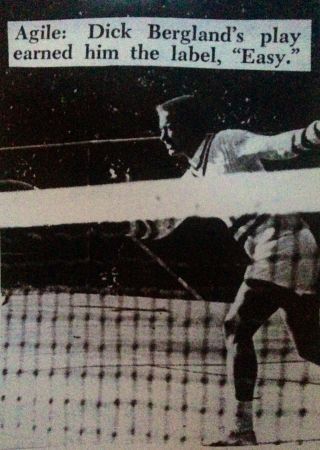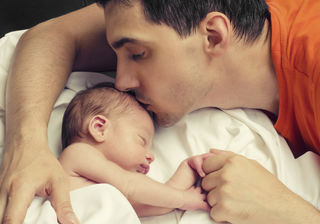Health
Dad's Psychological Well-Being Impacts His Kids' Development
A father's mental health strongly influences his children's development.
Posted July 16, 2016 Reviewed by Jessica Schrader
New research from Michigan State University (MSU) confirms that a father's role as a parent goes far beyond simply being a breadwinner. These empirical, evidence-based findings are a poignant reminder that every father has a life-altering responsibility to take care of his own psychological well-being in order to nurture and foster the well-being of his children.
In The Shining, Jack Nicholson plays a deranged father who loses his mind and famously says "Here's Johnny!" as he stalks his family with an ax. Clearly, this is an over-the-top example of a father's mental health going off the deep end.
Every father (especially of young children) needs to make his psychological well-being and stress reduction a top priority. If you are a parent—and feel as if you might need professional guidance to reduce your stress levels and optimize your mental health—please reach out and ask for help.
The Mental Health and Stress Levels of Both Mother and Father Really Matter
It should come as no surprise that fathers (and their state of mental health) play a huge role in their children's development. The latest findings from MSU show that a father's love and support—or lack thereof—has a significant impact on his kids' cognitive growth, social skills, and language acquisition from toddlerhood to fifth grade.
In particular, the study found that a father's parenting-related stress levels and mental health had a particularly harmful effect on his children's cognitive and language development when the children were 2 to 3 years old—even when a mothers' positive influences were taken into account. As might be expected, the fathers' influence appeared to have a stronger effect on boys' language than girls' language.
This new research provides some of the most conclusive empirical evidence to date illuminating the impact a fathers' psychological well-being has on his children's life outcomes. This data reinforces the recent clarion call by thought leaders stating that, as a society, we need to focus more on early childhood programs, such as the United States Department of Health and Human Services Head Start organization.
The MSU researchers emphasize the importance of focusing social services on mother and father equally. In a statement, Claire Vallotton, associate professor and primary investigator on this research project, said,
"There's this whole idea that grew out of past research that dads really don't have direct effects on their kids, that they just kind of create the tone for the household and that moms are the ones who affect their children's development. But here we show that fathers really do have a direct effect on kids, both in the short term and long term."
For this research, Vallotton and colleagues collected data from about 730 families who had participated in a survey of Early Head Start programs at 17 sites across the nation. The primary focus of the researcher's investigation was to unearth the effects of parents' stress and mental health problems such as depression on their children.

The new MSU findings add to a growing body of evidence that reaffirms the impact of fathers' characteristics and father-child relationships have on their children's development. These influences go beyond whether or not the father actually resides in the home of the child or has a daily presence in the child's life.
The latest July 2016 findings on the important role fathers play in their children's development were reported in two separate studies. The first, “More than Just the Breadwinner: The Effects of Fathers' Parenting Stress on Children's Language and Cognitive Development,” was published in the journal Infant and Child Development. The second, "Child Behavior Problems: Mothers’ and Fathers’ Mental Health Matters Today and Tomorrow," appeared in the journal Early Childhood Research Quarterly.
Other key findings of these studies included the discovery that fathers' and mothers' mental health had a similarly significant effect on behavior problems among toddlers. Also, fathers' mental health had a long-term impact on children's social skills (such as self-control and cooperation) when the children reached fifth grade. In fact, if a father showed depressive symptoms when children were toddlers this had more of a detrimental impact on a children's later social skills than the mothers' depressive symptoms.
Breaking the "Cat's In the Cradle" Syndrome of Becoming Your Father
As the father of an 8-year-old, I realized the moment my daughter was born, that taking care of my own psychological and physical well-being wasn't just about me anymore. Also, because I've personally struggled with major depressive episodes (MDE) and substance abuse at various stages of my life, I made a vow before deciding to have a child, that I would do everything in my power to make sure that her childhood environment set her up to avoid any genetic triggers that might be activated during vulnerable periods of her development.

My father did the best he could to be a nurturing and loving parent. Unfortunately, he was raised in an era that put an emphasis on emotionless "manlihood" and athleticism. Growing up, my dad didn't live in a time, or household, that nurtured his emotional intelligence or encouraged him to talk about his feelings. As a parent, he considered his primary role to succeed in his career and earn a lot of money. Unfortunately, the demands of his job meant he wasn't home much, which made "Cat's In the Cradle" my childhood anthem on a variety of levels.
Throughout his adult life, my father was a rageaholic who had terrible emotional regulation. His problems with anger management became painfully transparent when my parents' marriage began to unravel. My father wasn't able to maintain equanimity when his blood was boiling ... His hatred and desire to retaliate against my mother led him to hurt his kids in an attempt to hurt his ex-wife.
For example, when I was in high school, one morning, out of the blue, my dad quit his job as chief of neurosurgery at Harvard Medical School. He was on a plane to Australia that afternoon and lived on the beach for the next year and a half writing his manifesto, The Fabric of Mind (Viking). My father refused to return to the United States—or earn another penny to support his kids—unless my mom agreed to get divorced without receiving any alimony.
Needless to say, it was a tough period of childhood development for me and my sisters. At the time, we were at three different New England boarding schools. I've never felt so abandoned and alone. When I was 15, I began heavily abusing drugs and alcohol to make myself "comfortably numb." I also fell into a suicidal state of depression.
Luckily, I discovered running when I was 17 and was able to pull my life back together by the time I got to college. In my early 20s, I spent a few years in psychoanalysis at The White Institute on the Upper West Side, which helped me deconstruct my relationship with my dad. My analyst helped me identify ways that I could consciously choose to inherit his best traits, while pulling against any "nature/nurture" forces that would cause me to "become my father" and repeat similar patterns of neglect and abuse as a parent.
My grandfather (on my dad's side) abandoned his family when my father was young, as did his father before him, and so on ... I can attest to the fact that when it comes to fathers and sons, the apple often doesn’t fall far from the tree.
On the bright side, I think I inherited my father’s athletic prowess and interest in neuroscience. On the dark side, I also inherited a tendency towards what I suspect were his undiagnosed traits of mental illness. As is the case in many archetypal father-son narratives, my dad was both my Obi-Wan Kenobi and my Darth Vader.
From a very young age, I always knew that my father’s erratic behavior and periodic outbursts of rage were atypical. For example, we traveled a lot when I was growing up. Every time my family was in an airport, my father would have a rage attack and throw some type of tantrum towards airline employees, immigration agents, customs officials, etc. to levels heretofore unknown. My dad's outbursts became so predictable that my sisters and I nicknamed him “Dickus Maximus.”
Although my father was never given a clinical diagnosis for a particular mental illness, I have a hunch that he suffered from a hodge-podge of DSM-V things such as narcissistic personality disorder (NPD) and borderline personality disorder (BPD). Watching my father become angry and hateful towards others is the primary reason I’m obsessed with the parasympathetic nervous system and teaching people how to squelch the “fight-or-flight” response by maintaining healthy tone of your vagus nerve through mindfulness and deep breathing.
I'm happy to say that after many years of estrangement, my dad and I built a very strong father-son bond while I was writing my first book. While writing the manuscript for The Athlete's Way (St. Martin's Press), I spoke to my father every day, picking his brain for neuroscientific expertise.
In 2007, my father died unexpectedly. More than anything, I was incredibly grateful that there was no bad blood between us when he passed away. I also think that I've succeeded in breaking the pattern of a certain type of fatherly conduct being passed on from generation to generation.
Conclusion: A Father's Role In Child Development Should Never Be Underestimated

Tamesha Harewood, lead author on the paper from MSU's Department of Human Development and Family Studies emphasizes that fathers, in addition to mothers, should be included in parenting research and family-intervention programs and policies.
In a statement, Harewood concluded: "A lot of family-risk agencies are trying get the dad more involved, but these are some of the things they could be missing. When the agency is talking with the dad, it's not just about providing for your child economically, but also to be there for your child, to think about how stress or depression might be influencing your child. In order to understand and help children in their development, there needs to be a comprehensive view of the whole family, including both mom and dad."
Hopefully, my personal stories and the empirical evidence presented here will inspire any fathers (or fathers-to-be) reading this to make a concerted effort to be proactive about their mental health and stress reduction for the sake of their individual children and posterity.
© 2016 Christopher Bergland. All rights reserved.
Follow me on Twitter for updates on The Athlete’s Way blog posts.
The Athlete’s Way ® is a registered trademark of Christopher Bergland.




